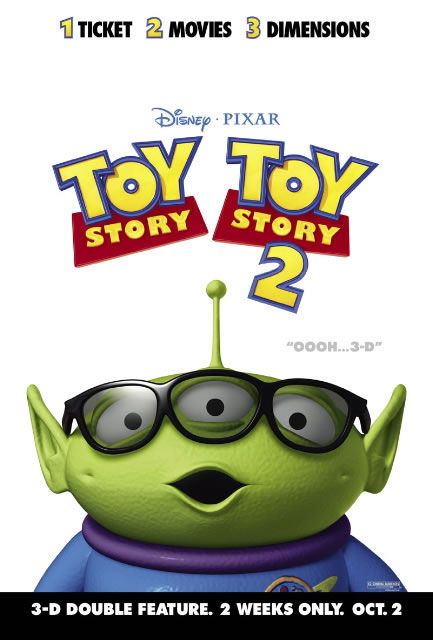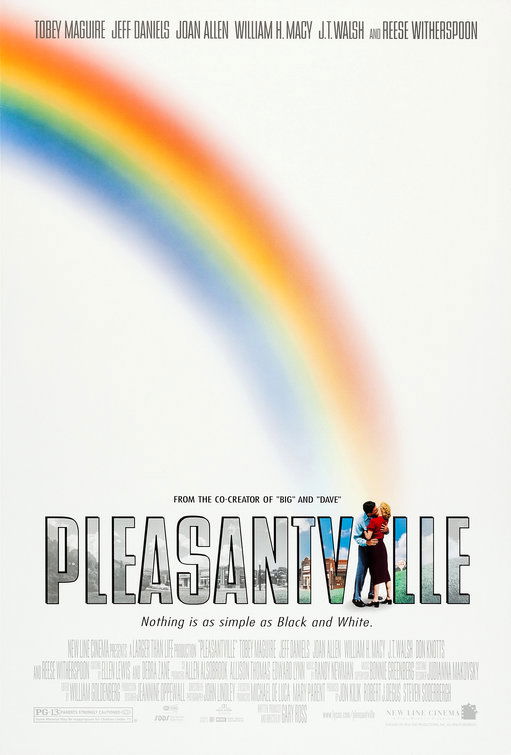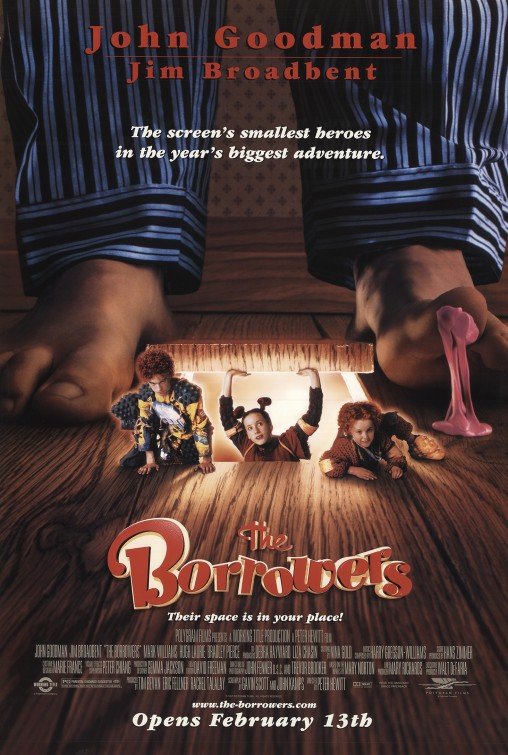"Through the Looking Glass"

| None | Light | Moderate | Heavy | |
|---|---|---|---|---|
| Language | ||||
| Violence | ||||
| Sex | ||||
| Nudity |
What You Need To Know:
PLEASANTVILLE is an enchanting and delightful movie. Gary Ross, the screenwriter of BIG and the politically correct DAVE, presents an exhilarating yet thought-provoking scenario in his directorial debut. PLEASANTVILLE endorses free speech, freedom of choice and facing inevitable change. Regretfully, the catalyst for this change is illicit sex between two teenagers. Also, other sexual themes are explored, and many exclamatory profanities are uttered. PLEASANTVILLE doesn't mock 1950's morality; instead, it mocks stagnation. The movie suggests that the good traits of Americana are now lost. Thus, PLEASANTVILLE asks us to look at where we are and what price we are now paying for abandoning morality
Content:
(B, AC, Pa, LLL, VV, SS, N, A, D, M) Light moral worldview of individuality, free will & freedom with anti-Communist symbolism & abuses of freedom that are eventually corrected; 9 obscenities,18 exclamatory profanities & 5 stronger profanities; town trashes store, boy punches boy, & vandalism; brief images of arms and legs hanging out of convertible cars implying fornication, sexual flirtation, masturbation implied, & adulterous kiss depicted, where unknowing fictional characters don't know of its immoral implications; contemporary teenage girls wearing shirts without bras on & painting of nude woman; alcohol use; smoking; and, miscellaneous immorality including rioting.
More Detail:
Including a plethora of themes and cinematic and literary references including THE WIZARD OF OZ, ALICE IN WONDERLAND, FOREST GUMP, FARENHEIT 451, and even THE ANDY GRIFFITH SHOW, PLEASANTVILLE is a contemporary fable contrasting today’s jaded society with a fictional 1950’s town. The movie teaches the costs and joys of freedom of expression and individuality.
Dave (Tobey Maguire) attends an average modern day high school. He is fascinated by an old-fashioned 1950’s black and white television series called PLEASANTVILLE. The reruns which Dave watches obsessively profile an Ossie and Harriet like family consisting of mother, father, and their son and daughter who are about the same age as Dave and his sister Jennifer (Reese Witherspoon). In PLEASANTVILLE, morals are very high and pleasant routine is expected. For example, the thermometer always reads 72, the bathrooms have no toilets, books are void of any print except on the covers, and no one ever dies.
Dave knows the names of all the characters in PLEASANTVILLE and all the details of the program, memorizing every line spoken. He intends to enter a quiz about the show. On the night that he is to watch the start of a PLEASANTVILLE marathon, he and his sister struggle to each take control of the remote control, but it flies out of their hands and smashes. Mysteriously, a TV repair man, played by Don Knotts, a key figure in THE ANDY GRIFFITH SHOW, arrives and gives them a strange looking remote. Once again, a tug-o-war ensues but this time as the PLEASANTVILLE series begins, they inadvertently press a button on the new remote and are magically transported into the fictional PLEASANTVILE, taking the place of the two kids in the series. The parents in the fifties black and white series communicate with Dave and Jennifer as if nothing out of the ordinary has taken place.
Dave and Jennifer first attempt to leave, but realize they may be stuck for a while in this black and white world. There is no color anywhere. They discover that life only exists in this one town where the citizens are limited to what the producer and writers of the series have written. They decide to play along with the somewhat sheltered inhabitants of PLEASANTVILLE, perceiving these people’s inability to engage with the real world. Jennifer, who at first blames her brother for this bizarre mishap, starts to settle down when a good looking boy shows up. Dave has to inform his sister about everything, including the names of all the people they encounter.
Life starts to change in PLEASANTVILLE when Jennifer seduces a boy and fornicates with him on lovers lane. For him, new emotions surface, and color gradually starts to appear here and there, representing the emergence of reality and individuality. There emerges color in the lights of an automobile, a single red rose with the rest void of color, and even skin color turns peachy. Books magically fill with words as Jennifer and Dave tell the stories of the books they know. Rainfall is experienced for the first time. When the soda fountain man (Jeff Daniels, who played the leading role in THE PURPLE ROSE OF CAIRO, which is also about fictional characters coming to life) discovers art, he paints a nude portrait of Dave’s mother Betty (Jo Ann Allen) in color and displays the painting in the window. The town is outraged, and a riot breaks out. Though his intentions weren’t necessarily to infuriate the crowd (he is, after all, ignorant of its implications and a new found lover of art), the implication is a critique against those who would disapprove of nudity in art.
The upstanding but still black and white citizens of PLEASANTVILLE object to this new liberated mentality and emerging color invading their community. A town meeting is called culminating in everyone and all of PLEASANTVILLE becoming full of color and their own ideas. Black and white citizens put up signs in their storefronts reading “NO COLOREDS.” A few minor riots occur (reminiscent of race riots), and the mayor brings Dave to trial. When the TV repair man re-emerges, Dave and his sister are faced with the choice to return home or stay in the still pleasant, but now alive and sometimes dangerous PLEASANTVILLE.
PLEASANTVILLE is a truly enchanting and delightful movie. Gary Ross, the screenwriter of BIG and the politically-correct DAVE, presents an exhilarating yet thought-provoking scenario in his directorial debut. It is a tremendously ambitious effort which pays off. PLEASANTVILLE pricks the conscience and asks some unavoidable questions regarding contemporary life. Nostalgia is rampant as baby boomers are taken back to their youth, albeit vicariously. Special effects are tastefully utilized, when black and white is applied and removed conveniently.
PLEASANTVILLE endorses free speech, freedom of choice and facing inevitable change. Regretfully, the catalyst for this change is Jennifer seducing an unknowing Pleasantville boy and fornicating with him. Because the writers only created storylines of flirtation and attraction, the boy doesn’t know anything about sex. He is pleasantly surprised. Soon, many of the teenagers are experimenting with sex. Exploring sexuality is a major theme in this movie. Other sexual situations include Jennifer teaching her Pleasantville mother how to “pleasure herself.” Mother does this, which sets off a fire in the front yard (an odd plot twist even in this fantasy world). Firemen come and, for the first time, put out an actual fire. Additionally, though not necessarily sexual, the soda jerk paints a nude portrait of the mother. Finally, the mother and the soda jerk share an adulterous kiss.
However, the ignorant people of Pleasantville do not know what they are doing. They don’t know it is wrong. They are merely exploring their new free will.
Jennifer’s initial sexual aggression and rebelliousness stand in stark contrast to the idyllic and moral nature of Pleasantville. Thankfully, the movie doesn’t continue to equate free will with free sex. It goes on to explore themes of being able to read books and to choose not to make dinner for your husband every night. It says that you can make choices to what music you choose and what people you befriend, and what order you clean up your soda shop.
Hence, PLEASANTVILLE doesn’t necessarily attack or mock 50’s morality, it mocks stagnation and the even then unrealistic manner in which life was portrayed on TV. Near the end of the story, Jennifer comes to respect the quiet, less dangerous nature of Pleasantville and even says, “I did the sl*t thing. It got old.” She sees that even a Pleasantville with citizens practicing free will is better than a contemporary society where citizens have given up their will towards wickedness. The movie suggests that the good traits of Americana are now lost in the present.
Just as FORREST GUMP asked us to look at contemporary society through the eyes of a simpleton, PLEASANTVILLE asks us to look at where we are and what price we are now paying for abandoning morality for an anything goes mentality. PLEASANTVILLE has two heroes going through our modern looking glass, a television set, and exploring a fantasy world, which metaphorically tells us of our woes and ills.



 - Content:
- Content: 


